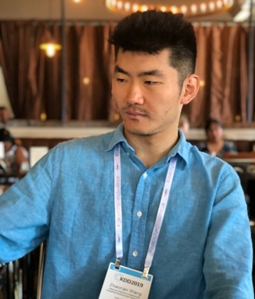The Ascender profile series showcases the talented individuals within the I-GUIDE Climbers community. These early-career scholars, including graduate students and postdoctoral researchers, share insights into their academic journeys, motivations, and aspirations. Explore the diverse stories of these Ascenders as they navigate the intersections of geospatial science, data innovation, and sustainability within the NSF I-GUIDE project.
Dr. Zhaonan Wang is a Postdoctoral Scholar with the Department of Geography and Geographic Information Science at the University of Illinois at Urbana-Champaign, IL. Within I-GUIDE, Zhaonan contributes to the development of the Geospatial Knowladge Hypercube and is a member of the I-GUIDE Climbers group and the Geospatial AI and Data Science Team.
In this interview, Dr. Wang discusses their diverse academic journey from a background in Geographic Information Science to specializing in geospatial AI. They share insights into their research role in I-GUIDE, involvement in the Geospatial AI and Data Science team, and aspirations to become an independent faculty member while reflecting on the influences that shaped their career path. The interview also touches upon the excitement of breakthroughs in adaptive spatio-temporal modeling, their perspective on AI’s impact on various fields, and their commitment to pursuing an academic career despite challenges.
What is your current position and institutional affiliations?
I am a postdoctoral research associate with the Department of Geography and Geographic Information Science at the University of Illinois Urbana-Champaign.
What is your role in I-GUIDE?
I play a multifaceted role in I-GUIDE. For the Geospatial AI and Data Science team I conduct research and development on the Geospatial Knowledge Hypercube, a new architecture for automatic and multidimensional geo-information extraction from unstructured text data. This supports cross-team applications on aging dams and metacoupling analysis. I am also a member of the I-GUIDE Climbers, a group of early-career researchers who meet regularly to share progress and ideas.
Tell us a little about your academic career trajectory and your current direction.
I majored within the broad scope of Geographic Information Science (GIScience) during my undergraduate program at Peking University. I leaned towards social science when pursuing my master’s in city planning at Boston University and gained more training on the cutting-edge AI/data science side during my PhD at the University of Tokyo. Now, my direction is to grow towards becoming an independent faculty specializing in emerging geospatial AI.

Did you start your academic career with the same goals and direction as you have now? If not, tell us a little about how and why your direction has changed?
When I enrolled in college and even while applying for for graduate schools, I had never seriously thought about a future academic career. I enjoyed being in the phase of life when many possibilities exist and thought I would become a practitioner like most people do. My journey of self-awareness began subtly with studying abroad and experiencing a cultural shift. I started thinking about what I’m good at doing and would enjoy doing, which led to fewer options.
What inspires you and motivates you to do the work that you do?
I would say the documentary called “Under the Dome” planted a seed in my heart when I watched it while studying in Boston. It was about the air pollution problem in my hometown, Beijing, which sparked my reflection on urban environmental problems and their causes. My master’s major project was on diagnosing urban air quality issues (using a classic machine learning method), and I also obtained a Graduate Certificate in Applied Sustainability. After that, I became more interested in urban data science.
What do you feel is most exciting about your field of study or your work?
I can still recall the excitement I felt after checking out an experiment figure that validated the idea of adaptive spatio-temporal modeling. I looked at the calm view outside through the window with a strong passion inside about its future impact. It’s important to maintain robust predictions, especially in an era of increasing hazards.
What has surprised you so far in your career journey?
While we’ve been witnessing various changes in many aspects of the world, I am still surprised to witness the birth of ChatGPT, a revolutionary AI product with profound impacts on every field and even on everyone, after rounds of trending topics in technology. We are witnessing human history getting closer to a future shaped by AI.
Do you have a Plan B? What do you think you’d be doing if you hadn’t chosen an academic career?
I don’t like the idea of a Plan B. When I made my decision to resign from an industry job, I just wanted to keep my mind on a single target, which was doing good research and pursuing a PhD at that time. At the end of the day, I don’t want to leave myself with any regrets. Even if Plan A fails, I can live with myself for having tried, without leaving an effort.
What is the next chapter in your career?
The next chapter of my career will be as a tenure-track assistant professor. I am currently on the academic job market this year and look forward to the next station of my journey.
Where do you see yourself in five to ten years? What are your ultimate career and professional goals?
I envision myself getting tenured in five years or more. I don’t think I’m that ambitious to have an ultimate goal. The beauty of the journey lies in the process, not the destination. What I’ll keep practicing is my philosophy, i.e., a beginner’s mind, to be open and willing to learn.